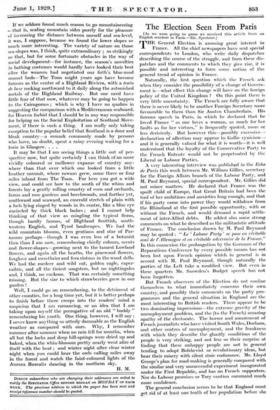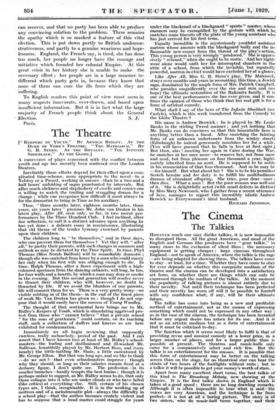The Election Seen From Paris
[As we were going to press we received this article from an English resident in Paris.--En. Spectator.] THE General Election is arousing great interest in France. All the chief newspapers have sent special correspondents to London, who write daily dispatches describing the course of the struggle, and from these dis- patches and the comments to which they give rise, it is possible and interesting to form some notion of the general trend of opinion in France.
Naturally, the first question which the French ask when they consider the possibility of a change of Govern- ment is—what effect this change will have on the foreign policy of the United Kingdom ? On this point there is very little uncertainty. The French are fully aware that there is never likely to be another Foreign Secretary more favourable to them than Sir Austen Chamberlain. His famous speech in Paris, in which he declared that he loved France "as one loves a woman, as muck for her faults as for her virtues," is frequently quoted, more or less derisively. But however this—possibly excessive— declaration of affection may appear to Gallic cynicism— and it is generally valued for what it is worth—it is well understood that the loyalty of the Conservative Party to the French Entente would not be perpetuated by the Liberal or Labour Parties.
A very interesting interview was published in the Echo de Paris this week between Mr. William Gillies, secretary for the Foreign Affairs branch of the Labour Party, and M. Paul Reynaud, special correspondent. Mr. Gullies did not mince matters. He declared that France was the spoilt child of Europe, that Great Britain had Seen the tool of her ambitions and anxieties long enough, and that if his party came into power they would withdraw from the Rhineland at the first possible opportunity, with or without the French, and would demand a rapid settle- ment of inter-Allied debts. He added also some strong comments on what he described as the militaristic attitude of France. The conclusion drawn by M. Paul Reynaud may be quoted : "Le 'Labour Party' se pose en veritable anti de rAllemagne et en veritable adversa ire de hi France." In this connexion the prolongation by the Germans of the Reparations Conference by every possible means has not been lost upon French opinion which in general is in accord with M. Paul Reynaud, though naturally the parties, of -the , Left take a modified view. But even in these quarters Mr. Snowden's Budget speech has not been forgotten.
But French observers of the Election do not confine themselves to what immediately concerns their own country, and possibly their comments on the party pro- grammes and the general situation in England are the most interesting to British readers. There appear to be two dominating impressions—the extreme gravity of the unemployment problem, and the (to the French) amazing apathy of the electorate. The horror and amazement of French journalists who have visited South Wales, Durham, and other centres of unemployment, and the frankness with which they describe the ghastly conditions of the people is very striking, and not less so their surprise at finding that these unhappy people are not in general tending to adopt Bolshevist or revolutionary ideas, but bear their misery with silent stoic endurance. Mr. Lloyd George's plan for road-making is generally compared with the similar and very .unsuccessful experiment inaugurated under the First Republic, and has no French supporters. Nor do Labour promises or Tory caution command much more confidence.
The general conclusion seems to be that England must get rid, of at least one tenth of her population before she can recover, and that no party has been able to produce any cOnviiicing solution-ti the problem. Mere renlins the apathy which is so marked a feature of this vital election. This is put down partly to British undemon-, strativeness, and partly to a genuine weariness and hopelessness. England, the French say, is tired, she has done too much, her people no longer have the courage and initiative which founded her colonial Empire.'" At this great crisis in her history she is unable to make the necessary effort ; her people are in a large measure in- different which party gets in, because they know that none of them can cure the ills from which they are 'suffering.
To English readers this point of view must seem in many respects inaccurate, over-drawn, and based upon insufficient information. But it is in fact what the large majority of French people think about the General











































 Previous page
Previous page